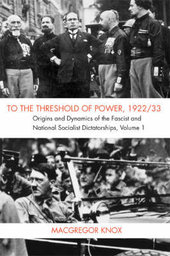
|
To the Threshold of Power, 1922/33: Origins and Dynamics of the Fascist and National Socialist Dictatorships
Paperback / softback
Main Details
Description
To the Threshold of Power is the first volume of a two-part work that seeks to explain the origins and dynamics of the Fascist and National Socialist dictatorships. It lays a foundation for understanding the Nazi and Fascist regimes through parallel investigations of Italian and German society, institutions, and national myths; the supreme test of the First World War; and the post-1918 struggles from which the Fascist and National Socialist movements emerged. It emphasizes two principal sources of movement: the nationalist mythology of the intellectuals and the institutional culture and agendas of the two armies, especially the Imperial German Army and its Reichswehr successor. The book's climax is the cataclysm of 1914-18 and the rise and triumph of militarily organized radical nationalist movements - Mussolini's Fasci di combattimento and Hitler's National Socialist German Workers' Party - dedicated to the perpetuation of the war and the overthrow of the post-1918 world order.
Author Biography
MacGregor Knox has served as Stevenson Professor of International History at the London School of Economics and Political Science since 1994. He was educated at Harvard College (B.A., 1967) and Yale University (Ph.D., 1977), and has also taught at the University of Rochester (United States). His writings deal with the wars and dictatorships of the savage first half of the twentieth century and with contemporary international and strategic history. They include Mussolini Unleashed, 1939-1941 (1982); The Making of Strategy: Rulers, States, and War (ed., with Williamson Murray and Alvin Bernstein) (1994); Common Destiny: Dictatorship, Foreign Policy, and War in Fascist Italy and Nazi Germany (2000); Hitler's Italian Allies: Royal Armed Forces, Fascist Regime, and the War of 1940-43 (2000); and The Dynamics of Military Revolution, 1300-2050 (ed., with Williamson Murray) (2001). Between his undergraduate and graduate studies he spent three years in the U.S. Army, and served in the Republic of Vietnam (1969) as rifle platoon leader with the 173rd Airborne Brigade.
Reviews'This superb study stands alone as a deep comparison of the origins of the rise of Fascism in Italy and National Socialism in Germany. Reaching back to the early nineteenth century, Knox's book provides a detailed, thoughtful, and provocative analysis of the political, economic, and social structures in both countries that led to the catastrophes of the twentieth century. In my view it is the best account of the rise to power and the relationship of both movements to the Great War that has ever been done. Lively, pointed, and gripping, the book will surely become a classic.' Isabel Hull, Cornell University 'MacGregor Knox has constructed an ambitious and compelling comparative analysis of the roots of Fascist and Nazi destructive dynamism of a kind which few scholars could have attempted. It is a splendid achievement.' Sir Ian Kershaw, University of Sheffield 'MacGregor Knox has completed a very ambitious work, which takes a fresh look at a key issue of twentieth century history, the origins and nature of European fascism. There have been many comparative studies, but no one else has done what Knox has achieved: a sustained comparison of Italian Fascism and German National Socialism in the light of the long-term peculiarities of their national histories. He succeeds admirably in explaining both their common features and their differences.' Adrian Lyttelton, Johns Hopkins University Center, Bologna 'MacGregor Knox's innovative, critical, and thoroughly documented works have thrown light both on Mussolini's dictatorship and its wars, and on the nature of German military traditions and the sources of the terrifying effectiveness of the Nazi armies. This volume offers a unique, sustained, and brilliant comparative analysis that stresses the centrality of military institutions and of the Great War in the genesis of the Fascist and National Socialist movements and regimes.' Giorgio Rochat, University of Turin, Italy 'Comparative history is one of the most promising, but also most demanding avenues of modern historiography. MacGregor Knox, whose fame in this field is already well established, succeeded in writing a comparative history of the German and Italian periods of dictatorship during the first half of the twentieth century. [The] two volumes [will] present fascinating analysis, and reading them will become a 'must' for all those who are interested in that era of the dark century.' Hans-Ulrich Wehler, Bielefeld University, Germany
|